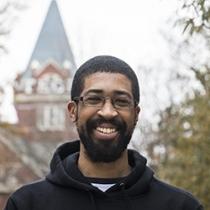
Julian D Brew
What is your next adventure?
I will be returning to AE to pursue my Ph.D. with [Professor] Marc Holzinger. We'll be continuing our work on reachability-related analysis. That's research that focuses on how far a system - any dynamic system - can go. There are equations that describe the motion of a system - whether it's a houseplant or a spaceship. We'll be using those equations to describe space applications, but, really, these equations can describe virtually anything.
What about your next adventure are you most looking forward to?
There are a couple of things. First, because I have an NSRF [NASA Space Research Foundation] fellowship, I can keep studying without having to take on the cost of getting a Ph.D. If I didn't go for a doctorate, it would be like leaving money on the table. That's a great feeling. The second reason is, I've gotten better and better at doing this work. Research always ends up generating new questions, forcing you to choose which ones you'll pursue and which ones you'll skip. I have some questions, now, that I want to pursue in my research. And I can pursue them as a Ph.D. student.
Did you have any previous co-op, internship, or research experience in this area?
I made a point of getting my foot in the door with work experience, so internships and co-ops have been a part of my education all along. The summer after freshman year I interned with Imagine Air, doing web development. It was my way of getting my foot in the door of aviation, even if I didn't do work related to what I am doing now. It gave me a chance to see what it was like to solve a problem, on my own, from scratch, which, really is a valuable experience. I also interned at the Air Force Research Lab (AFRL] in New Mexico, on the development of agile pointing space craft mission planning. That internship introduced me to guidance, navigation, and control - GNC- which is the general area where my research is centered now. I've done another rotation there, focusing on reachability analysis. I did two rotations at NASA-Johnson: one, where we focused on atmospheric density control systems (that's the system that controls the atmosphere within the spacecraft), and, the other, focusing on spectroscopy of objects in space. If you study the spectral bands of different materials in space, you can determine their properties and track them. I built a spectral database for them. This past summer, I interned at NASA Ames. Research-wise, I have worked with Dr. Holzinger, first, doing attitude, determination, and control systems (ADCS) work for the RECONSO cubesat, and magnetometry research to detect space debris. Right now, we're working on reachability analysis.
How did your educational experience at GT-AE help you achieve that goal?
There are three areas that I would mention: the faculty, the career opportunities, and the skills that you learn in class and in the lab.
The professors I have met here have opened up so many professional and research connections to me, connections that will help me with my research and with my career.
As far as career advice goes, we have a career center, career fairs, Career Buzz, and so many employers just visiting campus. I'm so thankful that I've been able to access these opportunities. I've never felt that my career objectives required a course correction. I always felt like things were working well.
And the work we do in the lab and in the classroom, it all allows you to build knowledge and skills. The more you know, the better you'll do on projects...and that's what lets you stand out.
What advice would you give to an underclassman who would like to follow the same path?
I would say three things will help any student do well at Tech, once they get in.
First, take advantage of whatever opportunities are made available to you - career fairs, study groups, office hours, whatever.
Second: whenever you need help, ask for it. Then take it. There are faculty, student groups, and grad students who will help you through the material you don't understand.
Third, co-op or intern. Even if it's not in the area that you think you want, you'll learn something about work, about project management, about resourcefulness.